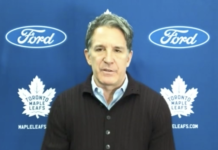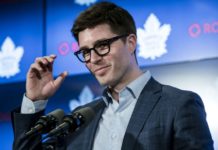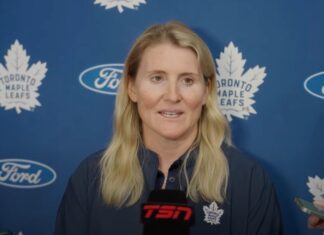
This past Wednesday I had the great good fortune to see the guest speaker, Toronto Maple Leafs President and GM Brian Burke, at the Scotiabank ® President’s Breakfast. In no way should I have been in attendance at this swanky affair used to reward lucrative business clients and senior management, but my branch manager is an avid hockey fan and when a favoured client had to pull out, I was a last minute substitution. As we stand on the eve of the trade deadline with the Leafs in a tailspin, I’d like to share with you some of the highlights from Burke’s speech and Q&A session held in the opulent Ratcliffe Room on the 63rd floor of Scotia Plaza.
As a brief primer, I must report that Brian Burke is a terrific raconteur who speaks confidently and lucidly at all times; but when given a chance exhibits a tremendous, ribald sense of humour. His bravado and bluntness quickly came to light as he approached the podium. With a cup of coffee and some prepared notes in hand, I expected him to begin formally with pleasantries and platitudes for his sponsor. Instead, raucous laughter met his opening line regarding the Leafs OT loss to the New Jersey Devils the night previous, “So that goal was horseshit!”
Among a surprising litany of swears, he elaborated upon his initial comment, succinctly explaining just how singularly god awful it is for a goaltender to let in a five-hole goal on a wide shot, before reflecting that Jonas Gustavsson has been the single most significant factor to the Leafs then-seeding of 8th place. Later in his speech he repeated that comment but balanced it by stating that if he’d had either of his shotguns on him at the ACC, he might have shot Gus. The room was in stitches.
After the opening salvo and some quick words of thanks, Burke delved into his personal philosophy for the construction and identity of the Toronto Maple Leafs. He spoke on 3 major themes:
1. Entertainment: The Toronto Maple Leafs, as a sports franchise, ought to play to their audience. Burke firmly stated that his teams play a run and gun style, because the high cost of admission demands exciting hockey. He continued by stating that he could hire defensive minded coaches who will adopt a 1 – 3 – 1 or even a 1 – 4, and sign players who excel in trap settings. He said he wanted a team that trades chances, scores and fights and concluded that he was satisfied with his success bringing in 2/3rds of what he wanted. He again lamented Colton Orr’s situation.
2. Business: The Buds’ players are employees of MLSE, albeit celebritized and highly paid. There needs to be accountability and retribution for failings. He decried the status quo of Canadian businesses that are unwilling or unable to demote, transfer or eliminate dead weight. Rosehill’s demotion would be an example of that, but my own editorial on this point is that clearly Burke needs to be more willing to practice what he preached.
3. Community Service/Community Presence: Burke said, “You can make a city love you before you ever win anything” and compared the fan support in Toronto favourably to Anaheim, where he claimed the franchise lost close to $8 million after winning the Stanley Cup. He echoed a point that my own grandfather was fond saying, that to those who much is given, much is expected. Burke targets players for their humanitarian and philanthropic accomplishments as much as their on ice performance, commending Dion Phaneuf for being the leader in that regard. He also explained that he’ll move any player who won’t participate within the community first chance he gets. Burke extended that sense of community interaction to include the Leafs organization within the NHL brain trust as a whole, suggesting that the Leafs as a franchise needed to improve their relationship with Bettman et al when he took over the club.
Beyond that, Burke had some excellent gems on some of the more pressing issues facing Leafs fans and hockey fans alike. Here were his best relatable comments.
On character and Burke-type players: Discussing community service naturally led into a long discussion about character, which Burke said he values as much as talent. He related a story about Trevor Linden, who was drafted behind Mike Modano in 1988. Linden couldn’t attend a scheduled meeting with Burke (who worked in Hockey Operations for the Canucks at the time), because of previous commitments to his family. His uncle owned a free-range cattle ranch in the hinterlands of Alberta, and being springtime they required Trevor’s assistance to brand the cattle as well as turn the young bulls into steers.
Burke asked Linden about the process, and Linden explained that young bulls need to be castrated as a part of the spring round up. Burke then inquired as to what his job in this would entail, and Linden explained that it would be his job to tackle and hold down the young bulls while his uncle and father would castrate them (think about that the next time you see him shilling for Clearly Contacts). Burke said that was sufficient reason to miss the interview, and the Canucks drafted him 2nd overall a few days later.
On the current state of the game: Burke was quite passionate about wanting a hybrid icing included into the game, expressing a real distaste in how dangerous to players the icing rules are right now. He felt that international hockey has gone too far in the other direction, and only through a hybrid touch/no-touch system can injuries be reduced while still keeping the game exciting.
On Phil Kessel: Burke spoke glowingly of Phil Kessel’s attitude and attempted to dispel the common belief that he’s aloof and disinterested in interviews. He explained, almost sheepishly, that Phil Kessel was plagued with shyness due to teenaged acne. During the pre-draft interviews of top prospects in 2006, Burke was left with an incredibly bad impression of Kessel, who wouldn’t look anyone in the eye and kept his head down throughout the interviews.
Burke said his opinion of Kessel changed during the World Championships in Halifax in 2009. Burke was GM of Team USA’s entry, and Kessel had just come off his 36 goal campaign with the Boston Bruins. While training for the event in Maine, Tim Gleason approached Phil Kessel to invite him on an ocean fishing trip with the rest of the team. Kessel explained to Gleason that while he loves to fish, he gets seasick on rough water and would feel awful all day.
Yet Kessel took part on the fishing trip, sucking up seasickness, for the sake of espirit de corps and team building. Kessel felt obliged towards his teammates regardless of his personal comfort. Burke remarked that he was impressed by such a team-first attitude from a young guy.
He also touched on Kessel’s maturity. After getting knocked out early in the tournament, there was a chartered flight for the team to Boston at 6 in the morning. Only 8 players decided to make that flight, and only two – Kessel and Gleason – showed up sober, well rested and dressed in suits. Kessel approached Burke, apologized for the team’s unsuccessful run and expressed a sincere distaste for not medaling in the tournament. It was then, Burke said, that he wanted Phil Kessel to play hockey for him.
On Nikolai Kulemin: Burke brought up Kulemin while discussing the importance of roster make-up. He’s a firm believer in having vocal leaders (Phaneuf, Lupul) and followers who are happy to let someone else lead and just play hockey (Kessel, Schenn and Kulemin). It led to perhaps the best quote of the morning, “Nik Kulemin couldn’t lead bees to a jar of honey!”
On a second team in Toronto/GTA/Kitchener-Waterloo: If it’s economically viable for the league, sure. But there are 3500 Buffalo Sabres seasons tickets holders in Southern Ontario. So probably not any time soon.
On the prospects: Burke was adamant in his opinion that Matt Frattin is the best prospect in the system at the moment (he exempted Jake Gardiner, who he figures as an NHLer), with Joe Colborne and Nazem Kadri right behind him. He also brought up Korbinian Holzer, who he sees as the next defenseman to graduate to the Leafs. He also brought up that Holzer along with Frattin were drafted by John Ferguson Jr., something he wants Leafs fans to remember.
With bravado Burke reported that he could acquire the assets to ensure the club made the playoffs by trading the five aforementioned players for more established veterans. He also said that he’d receive a bonus should the Leafs make the playoffs, but that he isn’t willing to part with such assets just to gasp into the playoffs and get eliminated in the first round.
At times it’s hard to remember, but Burke does have a plan in place, and even though one goal (the playoffs) is seemingly very attainable, he’s not going to rip out 3 years of methodical growth just for 4 – 7 games in mid April.
On Rick Nash: Scott Howson is said to be looking for as many as 4 pieces (something like either two prospects and a good young roster player or two roster players and a blue chip prospect and a 1st round pick) for Rick Nash, Burke believes that most teams just don’t have the desire to give that much up for Nash during the regular season. The risk of discombobulating a team’s chemistry can be far more deleterious than beneficial.
On Luke Schenn: Burke intimated that as many as 20 teams have kicked tires on Luke’s availability, but held steadfast that he has not ever initiated a trade conversation dangling Luke’s name. Burke sees Schenn as a 4/5 defenseman, and is compensating him thusly and is happy with him on the team.
On the deadline: Burke expressed again his desire to stay out of the water on deadline day, but that the problems in net – exacerbated by Gustavsson’s stinker against the Devils – may force his hand. He iterated that he hadn’t yet inquired deeply into the goalie market yet, but was going to. He said similar things on TSN Radio 1050 later that afternoon. So tomorrow, we’ll see what Tuesday’s loss brings us.
On the CBA negotiations: I asked Burke what his thoughts were on the biggest sticking point between the players and the owners in the impending negotiations. He said the current structure has 57% of the League’s revenue going to players’ salaries. That’s the highest of any of the major North American sports leagues. He remained optimistic that players won’t want to risk missing two seasons of a career so readily over a couple percentage points.
***
So while we all huddle around the TV tomorrow like junkies waiting in vain for a plethora of exciting and terrific trades, I hope you guys can enjoy the treasures from a chance encounter with Brian Burke. Also, Burke told this crazy story about Donald Brashear and the Vancouver Fire Department, but I might need to get Toronto Truculent to write up the screenplay. Absolutely ridiculous story.
Looking forward to your thoughts, here or on twitter: @MLHS_Mike



































